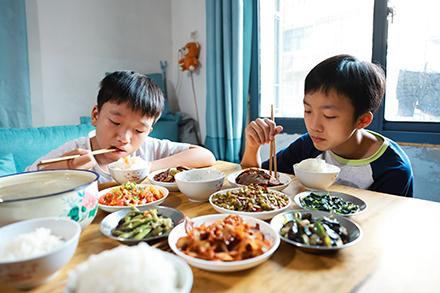Cultural Resilience: The Protective Role of Traditional Diets Against Food Insecurity

Limited or uncertain access to nutritious food is a persistent issue, especially among immigrant communities. Acculturation, the process by which individuals adopt the cultural norms and practices of a new society, significantly influences the food insecurity dynamic. ARS Research Epidemiologist Jessica Thomson and her colleagues, in partnership with researchers at the University of Central Arkansas, are exploring the intricate relationship between acculturation, food insecurity, and dietary patterns among Asian and Hispanic Americans. Their research aims to understand how these immigrant groups navigate and adapt to a new cultural environment, how this adaptation impacts their ability to access food, and subsequently, the nutritional quality of their diets.
"Typically, in the U. S. population, you find that as food security decreases, the quality of an individual’s diet also decreases," Thomson explains. "In our study, we found that this relationship was present only in the high acculturation groups for both Asian Americans and Hispanic Americans."
The study's findings challenged conventional wisdom, revealing that the detrimental impact of food insecurity on diet quality was primarily evident among those with high levels of acculturation. Thomson hypothesizes that the preservation of traditional dietary patterns among low and moderately acculturated individuals may serve as a protective factor against these adverse effects.
"It may be because the low and moderate acculturation groups were following more traditional diets that tend to be heavily plant-based and thus may cost less than the typical U.S. diet," Thomson suggests. "Hence, following more traditional Asian and Hispanic diets may protect against the negative effects food insecurity has on an individual’s diet quality."
The study also highlights an intriguing finding regarding awareness of dietary recommendations.
"We found that the positive relationship between awareness of dietary recommendations and diet quality was again only present in the high acculturation groups," Thomson notes. "This suggests that cultural alignment plays a crucial role in how dietary guidelines are perceived and followed."
Furthermore, the inability to accurately assess one's diet quality was found to be consistent across all acculturation levels, indicating a significant issue in dietary self-awareness.
"To us, this suggests that an individual’s perception of their diet quality is poor regardless of the level of U.S. diet adoption," Thomson remarks.
Thomson's study sheds light on the intricate relationship between acculturation, food insecurity, and diet quality among Asian and Hispanic Americans. By recognizing the protective role of low acculturation and traditional dietary practices, public health initiatives can better address the unique challenges faced by immigrant communities in maintaining healthy diets amidst food insecurity. By Katharina Hirschi, ARS’s Office of Communications

